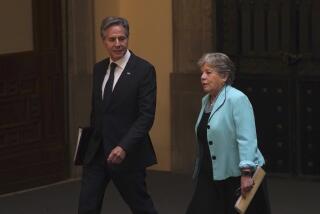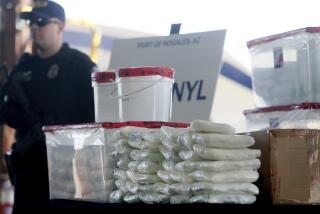New U.S. Andean Drug Policy Faces Test : Latin America: Peru and Bolivia want massive economic aid at the outset. This threatens a U.S. timetable.
- Share via
WASHINGTON — The Administration’s new Andean strategy, which calls for giving more narcotics-fighting aid to Peru and Bolivia, could be slowed by demands of those nations that the program include an immediate increase in economic assistance, officials said Friday.
The demands conflict with an Administration timetable that would delay any new economic aid until at least 1992 and furnish that aid only if Bolivia and Peru make significant progress in the anti-drug effort.
In discussions with the United States, the two cocaine-producing countries have demanded massive economic assistance at the outset of the proposed crackdown to cushion the blow to millions of campesinos dependent on the cocaine industry, the officials said.
Their statement provided the first specific indication that a major snag has developed as the Administration seeks to win approval from Peru, Bolivia and Colombia for its plan to take its war on drugs to those countries, which supply nearly all of the world’s cocaine.
A high-level U.S. delegation will travel to the Andean nations next week to outline the Administration plan in hopes of eliminating the potential impasse, which threatens to delay implementation of a planned $2.2-billion effort over the next five years, the officials said.
“Our strategy recognizes the need for an economic component to the war on drugs,” one official said. “But we don’t believe there should be new aid until there is clear progress.”
Last month, Congress gave the go-ahead to an Administration plan to spend $261 million on anti-drug assistance to the three countries in the current fiscal year. Most of the money would go toward military efforts, with other funds allocated for law enforcement and intelligence. No money is earmarked for additional economic aid.
The officials said that the positions taken so far by Peru and Bolivia indicate they might limit their participation in the anti-drug effort unless the economic assistance is forthcoming. The officials declined to disclose the sum of new assistance Peru and Bolivia are seeking for next year, but one source said it amounts to “hundreds of millions of dollars.”
Colombia, whose economy is healthier than that of the other two and which has already demonstrated its willingness to undertake a major anti-drug effort, has not requested immediate economic assistance, the officials said.
Other topics on the agenda of the traveling U.S. delegation, to be headed by Assistant Secretary of State Bernard W. Aronson, include still-secret proposals to bolster the American role in training South American troops for the anti-drug effort. Also to be discussed is a Pentagon plan, approved by the National Security Council, to station U.S. Navy ships off the northern coast of Colombia to help intercept ships and aircraft smuggling cocaine northward.
The meeting will also work on plans for a summit meeting between President Bush and leaders of the Andean nations tentatively scheduled to be held at Cartagena, Colombia, next February.
Bush told reporters in Denver on Friday that he hopes to go ahead with the meeting at Cartagena, despite renewed violence in that country blamed on Colombia’s drug cartels.
Bush visited Denver and Houston to stump for Republicans and address anti-drug rallies. He commented after William J. Bennett, director of the Administration’s office of national drug control policy, told reporters aboard Air Force One that the Administration is re-evaluating its plans because of the violence in Colombia.
Bennett said he had seen “no hesitation” on Bush’s part. But he said the traveling U.S. delegation will try during its stopover in Colombia to determine if Cartagena is a safe place for the meeting.
“President Bush feels very strongly that President (Virgilio) Barco wants him to come, and he’d like to make every effort to come,” Bennett said. But, he added, “the situation is so fluid now, we’ll have to see as things develop.”
He described the security situation in Colombia as “very, very rough.”
More to Read
Sign up for Essential California
The most important California stories and recommendations in your inbox every morning.
You may occasionally receive promotional content from the Los Angeles Times.










